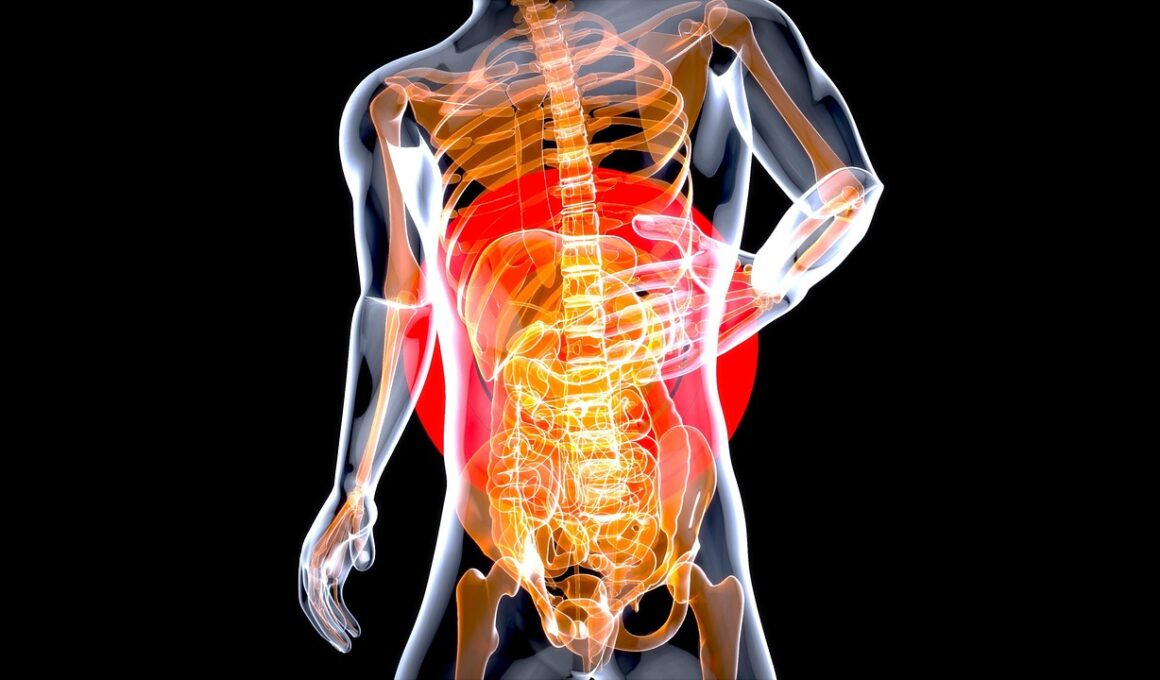Deep Breathing Exercises to Stimulate Digestive Enzymes
Breathing techniques play a crucial role in enhancing digestion by stimulating digestive enzymes. Deep breathing not only promotes relaxation but also improves oxygen flow throughout the body. When practiced correctly, deep breathing exercises can help regulate abdominal pressure. This regulation assists in creating an optimal environment for digestion. The act of inhaling deeply expands the diaphragm and abdominal cavity. This expansion helps massage the internal organs, especially the stomach and intestines. Furthermore, deep breathing aids in stress reduction. High stress can often lead to digestive issues such as bloating or constipation. By incorporating these exercises into your daily routine, you may alleviate discomfort. Simple techniques like diaphragmatic breathing involve deep, slow breaths. Practicing these regularly enhances your overall digestive health. Additionally, mindfulness combined with deep breathing can further enhance its effects. The focus on breath encourages body awareness and calmness. Embracing this can lead to more mindful eating experiences. In turn, this mindfulness fosters better digestion. Consider setting aside time each day for this practice. It may greatly assist in overall well-being, particularly for your digestive system.
Deep breathing techniques can be seamlessly integrated into daily routines to maximize their digestive benefits. One of the most effective methods is practice during meals. Taking a moment before starting your meal to engage in deep breathing can prepare your body for digestion. Inhale deeply through the nose, allowing your stomach to extend, then exhale gently through the mouth. This sets a favorable tone for digestion, prime for stimulating enzymes. Engaging in this practice helps the body switch to rest and digest mode. This process creates conditions under which digestive enzymes can work efficiently. Along with meal times, deep breathing exercises can also be beneficial during times of stress. Stress negatively impacts digestion, often causing issues like indigestion or cramps. By using deep breathing techniques, one can reduce stress and anxiety levels quickly and effectively. Even a few conscious breaths make a significant difference in overall digestive performance. Incorporating deep breathing activities during stressful moments at work or home can aid digestion. Remember that consistency is key; regular practice yields the best results. Incorporate this simple yet effective technique into your life for improved digestion.
Techniques for deep breathing can vary, and exploring different methods can enhance your experience. One popular method is the 4-7-8 breathing technique that can also aid digestion. Begin by inhaling through your nose for a count of four. Hold the breath for a count of seven. Finally, exhale slowly through your mouth for a count of eight. This rhythmic breathing pattern increases oxygen flow while also reducing stress levels. Another effective technique is belly breathing, focusing on the expansion of the abdomen. Place one hand on your chest and the other on your stomach. As you inhale, ensure the stomach rises more than the chest. This encourages maximum efficiency during breathing exercises, which ultimately supports the digestive system. If you find it challenging, practice while lying down. The goal is to develop a consistent habit that seamlessly incorporates deep breathing into your daily life. Experimenting with various techniques helps pinpoint what works best for you. No matter which technique you choose, their impact on digestive health remains significant. They promote relaxation and ease tension, positively influencing digestive enzyme function.
Benefits of Deep Breathing for Digestion
Deep breathing exercises create multiple benefits beyond just promoting better digestion. They encourage relaxation throughout the body, particularly in the abdomen. This relaxation is essential for an optimal digestive process. Additionally, deep breathing has been shown to increase blood circulation within the digestive organs. Enhanced circulation maximizes nutrient absorption during digestion. This heightened circulation helps the body efficiently utilize the nutrients present in food. Furthermore, effective deep breathing can reduce feelings of bloating and discomfort. Many individuals experience these issues due to poor digestion caused by stress. Incorporating deep breathing into meal times signs the body to produce digestive enzymes more effectively. Moreover, as stress levels drop during breathing exercises, digestive activities are encouraged. Notably, studies have shown that mindful breathing practices can reduce gastrointestinal symptoms effectively. A simple practice can lead to significant health benefits over time. Each deep breath holds potential for healing and well-being. Practicing deep breathing before meals can significantly enhance your entire eating experience. Overall, the benefits of deep breathing techniques extend beyond digestion alone. They contribute to a better quality of life and overall health.
To ensure the effectiveness of your deep breathing exercises, consider your environment and posture. Finding a quiet, comfortable space is important for focus and mindfulness. Sitting or lying down in a relaxed position encourages deep and fully engaged digestive breaths. Maintaining a good posture can further enhance the effectiveness of each breath. Relaxing your shoulders away from your ears allows the diaphragm to function optimally. Using pillows or cushions for support can help maintain a comfortable position. It’s also beneficial to close your eyes during deep breathing. This encourages heightened awareness of your breathing patterns and sensations. As you breathe deeply, allow your mind to clear and focus solely on breathing. Practicing regularly helps create a habit while encouraging awareness of your body’s responses during meals. Visualizing how the breath interacts with the digestive organs can enhance the experience. Recognize how each breath nourishes and supports your digestive health. With every deep inhalation, empower your body to function effectively. Incorporate these strategies into your routine to maximize your digestion strategies. You will observe notable changes in how your body processes food.
Integrating Deep Breathing into Daily Life
Integrating deep breathing into daily life is essential for long-term benefits. You can schedule short morning sessions to begin your day with focus and positivity. The morning is an ideal time for setting intentions, positively influencing your overall mindset. Additionally, during work breaks, engaging in a few minutes of deep breathing increases focus and productivity. This relaxation helps clear mental clutter, aiding clarity and digestion during lunchtime. Another effective integration method includes practicing before stressful situations. Whether before a meeting, presentation, or family gathering, deep breathing mitigates stress. Creating a habitual practice of deep breathing routines is key to their effectiveness. Setting reminders can encourage consistency in your practice. Use mobile apps or simple notifications to guide you. There are numerous resources available online for guided deep breathing exercises. Experiment with various techniques to find what resonates with you. Finally, journaling after practicing deep breathing can help you note feelings and physical sensations. This reflection not only reinforces the practice but also helps track any changes in digestion. Deep breathing is a valuable skill to cultivate and enhance your well-being through positive mental and physical shifts.
In conclusion, deep breathing exercises provide significant benefits for digestion and overall health. Regular practice helps stimulate your digestive enzymes effectively, improving your body’s ability to process food. The techniques are easy to learn and can be practiced almost anywhere, making them accessible to everyone. By incorporating deep breathing into your daily routine, you’ll likely notice enhanced digestion, reduced stress levels, and increased energy. Stress often hampers digestive functions, making deep breathing a practical solution for many digestive woes. It encourages relaxation, which is essential for optimal functioning of the digestive system. Deep breathing also supports increased blood flow, which further assists in nutrient absorption during digestion. The simplicity of these exercises is their appeal; anyone can benefit regardless of their lifestyle or age. Small adjustments, such as deep breaths before meals, can lead to profound changes over time. As you embark on this journey toward improved digestion and well-being, remember to be patient. Consistency and mindfulness are crucial in this transformation. Embrace the benefits of deep breathing for digestion. Your health, energy, and overall quality of life will undoubtedly improve.





